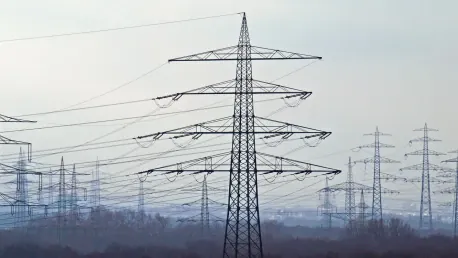The Tennessee Valley Authority (TVA), a federally owned electric utility corporation, is facing increasing electricity demands driven by data centers, battery manufacturing, and growing consumer electrification. A recent report by the American Council on Renewable Energy (ACORE) calls on Congress to reform TVA’s governance and energy planning to better address these rising demands. TVA, which serves over nine million people in seven states, including Kentucky, experienced record power demand exceeding 35,000 megawatts in January 2023 due to extreme cold temperatures, highlighting the urgent need for modernization and enhanced strategic oversight.
Unique Governance Structure of TVA
Unlike other utilities regulated by state utility commissions, TVA is overseen by a board of directors appointed by the president and confirmed by the U.S. Senate. This unique structure exempts TVA from state-level oversight, such as approval processes for new power generation or reviews of future power plans, presenting both strengths and challenges in its operations. The ACORE report suggests that TVA’s structure could benefit from reforms aimed at improving transparency and decision-making, particularly through the inclusion of input from independent experts. Enhanced oversight is believed to help the corporation prepare more effectively for evolving and intensifying power demands in the region.
Recently, TVA has invested hundreds of millions of dollars in its power plants to enhance their reliability and resiliency following the imposition of rolling blackouts during a winter storm in 2022. Despite these substantial investments, the utility had to borrow power from neighboring electric grids to meet the record demand in January 2023, prompting it to request customers to voluntarily reduce power consumption. These challenges underscore the need for TVA to request Congress for an increase in its borrowing authority. However, such a request should be addressed cautiously and coupled with requirements to improve operational efficiency and customer service across its distribution network.
Recommendations for Federal Oversight and Transmission Planning
The 33-page ACORE report suggests multiple reforms that Congress could enact to bring TVA under more rigorous federal oversight. One significant recommendation includes providing more support for TVA boards by ensuring federal oversight, particularly in transmission planning, and revising the process for drafting the integrated resource plan (IRP), which is an essential planning document. TVA spokesperson Scott Fiedler indicated that the utility is currently conducting a transparent and robust IRP process, with aims to include public participation, and plans to release a finalized IRP in the spring. This proactive approach aims for inclusive and comprehensive strategic planning.
Additionally, a panel discussion accompanying the ACORE report, consisting of representatives from renewable energy advocacy groups and a Nashville-based solar developer, emphasized the urgent need to reform TVA’s transmission planning. During the discussion, the panel criticized the current process for its lack of transparency and stakeholder participation, arguing that it leaves many stakeholders without a voice in decisions that impact electricity generation, transmission, and overall utility costs. Myra Sinnott, vice president of interconnection and policy for Silicon Ranch, highlighted the adverse effects of a “closed doors” process on stakeholders’ ability to provide meaningful feedback on TVA’s future resource planning, stressing the importance of making room for diverse inputs.
Broader Considerations in Energy Planning
The ACORE report also suggests that TVA should consider a broader range of costs and benefits when planning transmission and generation, going beyond merely ensuring adequate and reliable services. By expanding considerations, TVA could enhance grid reliability as more renewable energy projects, such as solar power, come online. This holistic approach would consider not only the operational aspects but also the environmental and economic factors tied to energy generation, ensuring a balanced and forward-thinking energy strategy.
Federal oversight through the Federal Energy Regulatory Commission (FERC) is another key recommendation put forth by the report. Such oversight would ensure TVA’s compliance with federal transmission planning regulations and encourage more inter-regional transmission among electricity grids, which is essential to prevent rolling blackouts during extreme weather and to meet expected load growth. ACORE’s Jonathan Geldof emphasized the necessity of inter-regional transmission networks to guarantee reliability and sustainability in the face of mounting power demands, promoting a cohesive national grid strategy.
Independent Oversight and Expert Input
Furthermore, ACORE’s report recommends that Congress mandate TVA to employ independent staff or consultants to assist its governing board in decision-making and operations. Simon Mahan, executive director of the Southern Renewable Energy Association, noted that TVA’s part-time board lacks independent third-party verification of information provided by TVA staff. This stands in stark contrast to other utilities regulated by state commissions, which benefit from expert scrutiny and valuable input from intervening parties, helping to refine and perfect their operational strategies and decision-making processes.
One pressing concern raised by renewable energy advocates is TVA’s proposed investment in natural gas-fired power plants as replacements for its coal-fired plants. Maggie Shober, research director for the Southern Alliance for Clean Energy, warned that increasing reliance on natural gas could pose financial risks to TVA customers, particularly if natural gas exports rise, causing domestic prices to surge. This financial volatility could undermine TVA’s efforts to provide stable and affordable energy solutions, placing undue burden on end-users.
Enhancing Transparency and Stakeholder Participation
The Tennessee Valley Authority (TVA), a federal entity that generates and distributes electricity, is contending with escalating energy needs driven by several factors including data centers, battery production, and a surge in consumer electrification. The American Council on Renewable Energy (ACORE) recently published a report urging Congress to revamp TVA’s governance and energy planning structures to more effectively handle these growing demands. TVA’s service area spans seven states and includes over nine million people. In January 2023, TVA faced record-breaking power demand surpassing 35,000 megawatts due to exceptionally cold weather, underscoring the critical necessity for modernization and improved strategic governance. According to ACORE, the current governance model of TVA may be insufficient for the evolving requirements and challenges ahead. The report highlights the pressing need for reforms to ensure that TVA can sustainably meet future electricity demands while also enhancing its operational and strategic capabilities.









